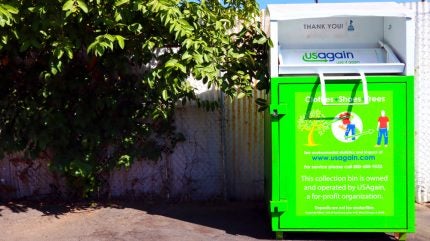
Leading apparel and footwear associations in California have signed a memorandum of understanding to form a nonprofit Producer Responsibility Organisation (PRO).
This marks the country’s first collective step under Senate Bill 707 (SB 707), aiming to set up a statewide system for textile recycling, repair and reuse.

Discover B2B Marketing That Performs
Combine business intelligence and editorial excellence to reach engaged professionals across 36 leading media platforms.
The initiative will help producers comply with the state’s extended producer responsibility requirements, with formal approval from CalRecycle expected by March 2026.
EPR and SB 707: shifting responsibility for textile recycling
California’s SB 707, known as the Responsible Textile Recovery Act, is the nation’s pioneering extended producer responsibility (EPR) law targeting textiles.
Under the law, manufacturers, importers and retailers are required to share responsibility for their products at end‑of‑life, shifting costs from consumers and local governments back to the businesses.
Producers must form or join a PRO approved by CalRecycle by January 2026, with all obligations active by mid‑2026.

US Tariffs are shifting - will you react or anticipate?
Don’t let policy changes catch you off guard. Stay proactive with real-time data and expert analysis.
By GlobalDataThe PRO will handle collecting, sorting, repairing and recycling textile items and submit a formal stewardship plan, updated every five years.
Why textile recycling matters now
Textile waste has surged in recent decades—global levels increased almost tenfold since 1960, and in California alone 1.2 million tons were landfilled in 2021, accounting for around 3 per cent of the state’s total waste.
Most discarded garments are made of mixed fibres, creating barriers to textile recycling and causing them to be down‑cycled for insulation or rags rather than turned back into clothing.
The lack of convenient infrastructure—only about 15 per cent of US textiles were recycled as of 2018—means fast fashion continues to drive pollution and waste.
SB 707 aims to expand access to free, convenient drop‑off and mail‑back options, with a target of full programme rollout by 2030.
Industry collaboration to build a circular system
Under the MOU, the California Retailers Association, American Apparel & Footwear Association and National Retail Federation will oversee creation of the PRO as a 501(c)(3) independent body.
Rachel Michelin of the California Retailers Association described SB 707 as “groundbreaking” and said the initiative will unite diverse players—from manufacturers and brands to sorters and repairers—behind a shared environmental effort.
The PRO will design collection site networks in all counties, partner on public education and track the flow of textiles through the system. Non‑compliance may result in substantial fines, up to US $50,000 per day.
California’s leadership sparks wider EPR interest
California joins global peers—France launched textile EPR in 2008 and the Netherlands in 2023—and builds on its own EPR programmes for packaging, electronics and other products.
Experts predict that more states may follow suit, inspired by California’s early successes.
As the state prepares to open the formal PRO application window in late 2025 and approve organisations in early 2026, producers across the textile supply chain are advised to assess their roles, product ranges and sustainable design strategies to align with this new law.





